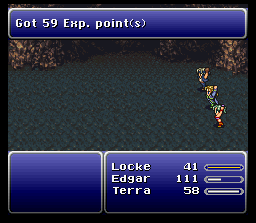And sometimes, the characters raise the roof.
Conversely, if the player does poorly, the game is sure to indicate his or her shortcomings through the use of music. These musical cues generally activate when the player dies, fails a mission, loses a race, etc., and the most extreme of these cases is the dreaded "Game Over" screen, indicating the ultimate failure in the game. But how do these musical clips interact with the player? What purpose do they serve other than a reinforcement of the visual indication of gain or loss?
One function of this music is positive reinforcement. As shown in the Portal example above, the music changes when the player gets closer to solving the puzzle. The addition of music indicates to the player that the actions that he or she is taking are correct and are to be continued. In The Legend of Zelda: The Wind Waker, this technique is used during battles, and it indicates that you are dealing damage to your enemies:
Red Wizzrobe Battle from The Legend of Zelda: The Wind Waker
Another function is the simple sense of accomplishment that comes along with completing a task or finishing a segment of the game. It inspires continued playing because they know that progress is being made. In more linear games especially, it is an important factor to signify this progress; this is why many platformers are divided into different levels and why each level is punctuated with a musical fanfare. Each stage is its own mini-narrative, complete with a soundtrack that ends when you finish that chapter of the story.
Green Hill Zone, Act 1 - Sonic the Hedgehog
Interestingly, this rewarding system can also be used with negative reinforcement (that is, the reinforcement of an action through removing something bad). In horror games, music is used to create suspense and terror, in the moments both leading up to and during frightening scenes. In Amnesia: The Dark Descent, the player learns to associate thumping rhythms and music with the approach of an enemy. The louder or more intense the music becomes, the closer an enemy is; therefore, the player comes to understand that sustained music of any sort is to be avoided. In the same vein, when the player reaches the next safe area, the music fades out almost completely, as shown in the video below.
Similarly, other games use music as a deterrent of particular behaviors: namely, death. There are several different ways to approach this music usage, the most common being music that plays when your character dies. One of the more powerful (and for me, somewhat scarring) pieces of "death music" occurs in Disney's The Lion King for the Super NES. This music, combined with the stark visuals of your dying lion in front of a barren, black background, makes for a deeply disturbing experience when you die. The music is a simple C-minor melody, but it's just enough to make a player do anything to prevent having to hear it again.
A more recent example comes from Catherine for the PS3 and Xbox 360. The gameplay has you climbing for your life to the top of a tower of blocks while it slowly disintegrates behind you. As if the monsters and traps weren't enough for this nightmarish Hellscape, it's a very long fall from the tower. If you're unlucky enough to fall from your place on the tower, you hear this music play along with this rather horrifying scene:
Love is over, indeed.
In a previous article, I discussed how composer Shoji Meguro remixed pieces of classical music to use within the action stages, which adds to the sense of the main character being in a dream. This particular piece borrows the first several bars of Pablo de Sarasate's Zigeunerweisen, written in 1878. As if tailored to accompany a death, the dramatic opening passage is followed by a lugubrious solo violin, emphasizing your solitary death at the bottom of a broken heap.
Why is this music so effective as a punishment? Death music is potent in part because it adds another dimension to the player's failure. While the visual element plays a vital part in the construction of the player's perception of defeat, music is an active, audible part as well. A great example of music participating in the player's failure comes from SEGA's Sonic Unleashed, where the "Rank E" music has the same form and melody as the standard victory music but with a cacophonous and ear-shattering twist.
"Rank E" - Sonic Unleashed
Strangely enough, though, it doesn't always make you feel bad about yourself to hear this tune. In fact, it's pretty hilarious. This makes it particularly effective: while it's clearly indicative of a substandard outcome, it's a comedic reminder to succeed rather than a harsh punishment for failure, effectively encouraging the player to try again. This is what these forms of music ultimately aim to do. Whatever the methodology, they present audible cues to prod the player into continuing his or her journey. The music can't be bad enough that it discourages the player from picking up the controller again, but it can't be positive enough to rob the players of an incentive to proceed. Finding the balance between these extremes is a difficult task but one that is integral to player perseverance.


Just wanted to say, I picked up on this blog about 2 weeks ago and its been absolutely fantastic! Hope you are still producing new content, as they've all been amazing reads and listens so far, thank you much!
ReplyDeleteHey Nice article on game ..Thanks ..
ReplyDeleteVery informative blog..Keep posting..
ReplyDeleteNice games ...Thanks for sharing...
ReplyDeleteAbsolutely beautiful game ...
ReplyDeletevisit website : You can get the Best Quality Karaoke Tracks ever made at an unbelievable price through our website. Our classy team of musicians provide you the incredible quality karaoke tracks in less than a week.
ReplyDelete